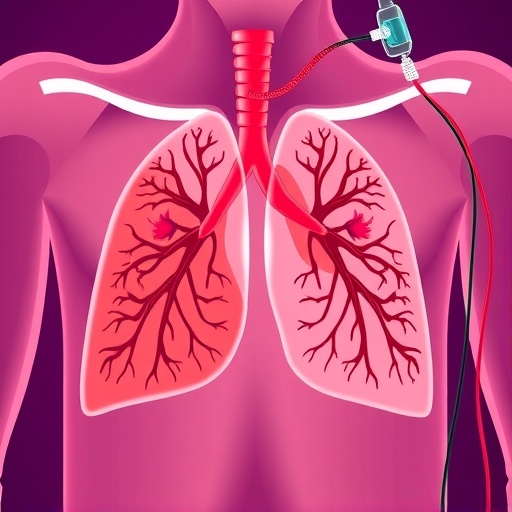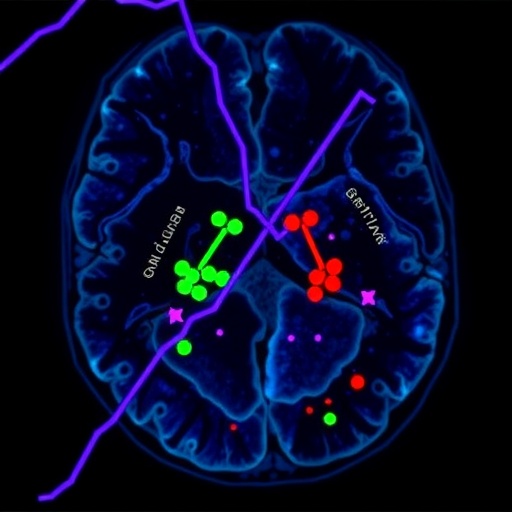
Takotsubo syndrome, often referred to as broken heart syndrome, emerges as a fascinating yet distressing medical phenomenon. Characterized by sudden and temporary weakening of the heart muscle, this syndrome mimics the symptoms of a heart attack, yet a definitive blockage in the coronary arteries is often absent. A recent study led by Obrutu, Cui, and Maughan investigates the intricate psychosocial and clinical characteristics associated with this enigmatic condition. This cutting-edge research sheds light on the potential triggers and predispositions that may play a critical role in the onset of Takotsubo syndrome, delving into a nexus of psychological factors and clinical presentations that demand our attention.
The study highlights that a significant portion of Takotsubo syndrome cases occurs in the aftermath of intense emotional or physical stress. As investigators gathered data from a diverse cohort, it became evident that both acute grief and overwhelming anxiety serve as pivotal risk factors. Participants reported experiencing distressing life events preceding the onset of symptoms, illuminating a compelling connection between psychological trauma and cardiovascular complications. This research accentuates the necessity for robust psychological assessments in patients exhibiting symptoms characteristic of this syndrome.
Furthermore, the researchers uncovered noteworthy demographic trends within their patient cohort. It was observed that Takotsubo syndrome predominantly affects postmenopausal women, a population potentially subject to hormonal fluctuations that may increase susceptibility. This demographic specificity reinforces the need for tailored approaches when addressing mental health and physical health in women, particularly in later stages of life. Understanding how gender and hormonal factors interplay with psychological states could pave the way for personalized treatment strategies that may mitigate the risk of developing this syndrome.
The clinical presentations of Takotsubo syndrome can vary widely among individuals, warranting careful consideration during diagnosis. Patients may present with chest pain, shortness of breath, or other cardiac-related symptoms, often leading to misdiagnosis as a traditional myocardial infarction. This uncertainty necessitates a thorough investigation, including echocardiograms and cardiac imaging, to distinguish Takotsubo from other cardiac conditions. The study advocates for heightened awareness among healthcare professionals to facilitate early recognition and appropriate management of this syndrome, thereby reducing unnecessary stress and anxiety in affected individuals.
Collectively, the psychosocial aspects uncovered in this study provide critical insights into the intricate tapestry of mind-body interactions. Psychological distress can manifest physically, exerting substantial influence over heart health. The researchers emphasize the importance of addressing mental health while treating patients with cardiovascular conditions, urging a paradigm shift towards an integrated approach that considers both psychological and physiological components of health. By drawing connections between emotional wellbeing and heart health, this research holds promise for improving patient outcomes and promoting holistic care practices.
Moreover, the study touches on the implications of social support systems in mitigating risks associated with Takotsubo syndrome. The presence of a robust support network appears to act as a buffer against the psychogenic stressors that may precipitate episodes of this syndrome. Future investigations should explore the precise roles that social connectivity, resilience, and coping mechanisms play in influencing the incidence of Takotsubo syndrome. Strengthening societal support structures may serve as a preventative measure, assisting individuals in navigating crises more effectively and potentially reducing the incidence of this distressing condition.
A key focus of the research delves into the neurobiological underpinnings of Takotsubo syndrome, where stress-induced catecholamine surges may precipitate the cardiac dysfunction observed in affected individuals. The interplay of psychological stress and biochemical reactions illustrates the complexity of the syndrome, underlining the necessity for multi-disciplinary approaches to treatment and prevention. The findings invite further exploration into pharmacological interventions aimed at moderating neurohormonal responses during periods of acute stress, potentially offering new avenues for therapeutic development.
This comprehensive study reiterates the urgency of public education surrounding Takotsubo syndrome. Increasing awareness about the condition can empower individuals to recognize early signs and seek timely care. Moreover, enhancing understanding among healthcare providers about the syndrome’s psychosocial links may lead to more nuanced and effective treatment protocols. The emphasis should be placed on destigmatizing mental health inquiries during clinical assessments and fostering an environment where patients feel comfortable discussing stressors that may contribute to their cardiac symptoms.
Through this research, the implications of lifestyle modifications, including stress management techniques, are also illuminated. Integrating mindfulness practices, cognitive behavioral therapy, and other psychological interventions into patient care regimens could potentially ameliorate both mental health and cardiovascular stability. The results suggest that fostering emotional resilience may not only help in managing existing symptoms but also serve as a proactive measure to prevent future episodes of Takotsubo syndrome.
In conclusion, the study led by Obrutu and colleagues significantly advances our understanding of the psychosocial and clinical characteristics in Takotsubo syndrome. By blending insights from psychology and cardiology, the research underscores the vital relationships between emotional health and physical well-being. It is crucial for both researchers and clinicians to continue exploring these interconnections, striving for comprehensive care strategies that encompass the full spectrum of factors influencing heart health. As we deepen our understanding of the human body’s response to stress and trauma, we unlock the potential to revolutionize approaches to treatment, ultimately improving outcomes for those impacted by Takotsubo syndrome.
The journey to unraveling the complexities of Takotsubo syndrome is just beginning. As future research emerges, it is hoped that insights gained will contribute to a deeper understanding of this condition, paving the way for enhanced diagnostic and therapeutic frameworks. The intersection of mental health and cardiovascular stability remains a crucial frontier in modern medicine, and this study serves as an important catalyst for continued exploration and innovation in addressing the challenges posed by this intriguing syndrome.
Subject of Research: Psychosocial and clinical characteristics of Takotsubo syndrome.
Article Title: Psychosocial and clinical characteristics in Takotsubo syndrome.
Article References:
Obrutu, O., Cui, Y., Maughan, J. et al. Psychosocial and clinical characteristics in Takotsubo syndrome.
Biol Sex Differ 16, 42 (2025). https://doi.org/10.1186/s13293-025-00729-0
Image Credits: AI Generated
DOI: 10.1186/s13293-025-00729-0
Keywords: Takotsubo syndrome, psychosocial characteristics, emotional stress, cardiovascular health, gender differences, mental health, support systems, neurobiology.
Tags: acute grief and heart conditionsanxiety as a risk factor for Takotsubo syndromeclinical characteristics of broken heart syndromedemographic trends in Takotsubo syndrome casesemotional stress and heart healthheart muscle weakening and stresspsychological assessments in cardiac patientspsychological trauma and cardiovascular complicationspsychosocial factors in heart diseaseresearch on cardiovascular psychosocial aspectsTakotsubo syndrometriggers of Takotsubo syndrome




